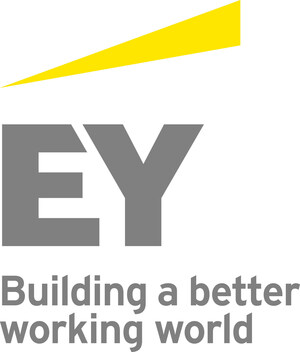-- 56% of senior AI professionals say a lack of talent is the greatest barrier to implementation within business operations
-- 41% see gender diversity of existing AI talent influencing machine biases
-- 62% have a positive sentiment towards AI
LONDON & PALO ALTO, Calif., Dec. 14, 2017 /PRNewswire/ -- Businesses are continuing to integrate artificial intelligence (AI) into their business operations despite a lack of talent, according to an EY poll of 200 senior AI professionals on the current state of AI adoption and integration.
Talent is a principal concern for poll respondents, with 56% reporting a lack of AI experts as their greatest barrier to implementation of AI into business operations. Organizations are also concerned about the diversity of available talent, with 41% noting that gender diversity can influence the biases that machines will learn.
Chris Mazzei, EY Global Innovation Technologies Leader and Global Chief Analytics Officer, says:
"This year, as businesses strategized how to integrate AI into their operations, they were hampered by a shortage of experts with requisite knowledge of the technology. This serves to demonstrate that successful AI integration is not just about the technology, it's about the people. Looking to 2018, organizations should prioritize talent acquisition and cultivation—both by recruiting individuals with strong technical backgrounds and investing in skills and training programs to help retain and foster leading AI practitioners."
Despite obstacles AI momentum continues
The poll found that businesses are overcoming internal resistance to the technology. Thirty-three percent of respondents cited stakeholder buy-in as a barrier to AI implementation. The positive shift in sentiment suggests that stakeholders are increasingly embracing the potential of AI.
Findings also showed although businesses have moved further along in the process of AI implementation this year, they are at different stages. While 17% are just evaluating options for where to implement AI and 26% are in the piloting stage, 67% have someone specifically dedicated to driving AI efforts inside their organization. Overall, 62% of employees have a positive sentiment towards AI.
Nigel Duffy, EY Global Innovation AI Leader, says:
"Organizations have come a long way on the AI learning curve, and we expect the pace of adoption to accelerate in 2018. The aspirational goal of AI is to take intelligence and put it into machines. To be successful, leaders should identify a business challenge and then determine where the technology can solve this problem – but this can only be realized with the support of AI-savvy professionals who can identify AI opportunities in their business."
About EY
EY is a global leader in assurance, tax, transaction and advisory services. The insights and quality services we deliver help build trust and confidence in the capital markets and in economies the world over. We develop outstanding leaders who team to deliver on our promises to all of our stakeholders. In so doing, we play a critical role in building a better working world for our people, for our clients and for our communities.
EY refers to the global organization, and may refer to one or more, of the member firms of Ernst & Young Global Limited, each of which is a separate legal entity. Ernst & Young Global Limited, a UK company limited by guarantee, does not provide services to clients. For more information about our organization, please visit ey.com.
This news release has been issued by EYGM Limited, a member of the global EY organization that also does not provide any services to clients.
About the survey
EY polled 200 senior AI professionals in San Francisco in September 2017 to gather insights regarding AI integration challenges and trends faced by industry professionals over the past year.
Lizette Kodama
EY Global Media Relations
+1 212 773 7472
lizette.kodama@ey.com
Logo - https://mma.prnewswire.com/media/381362/EY_Logo.jpg



Share this article